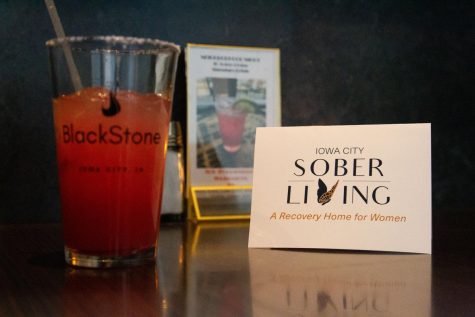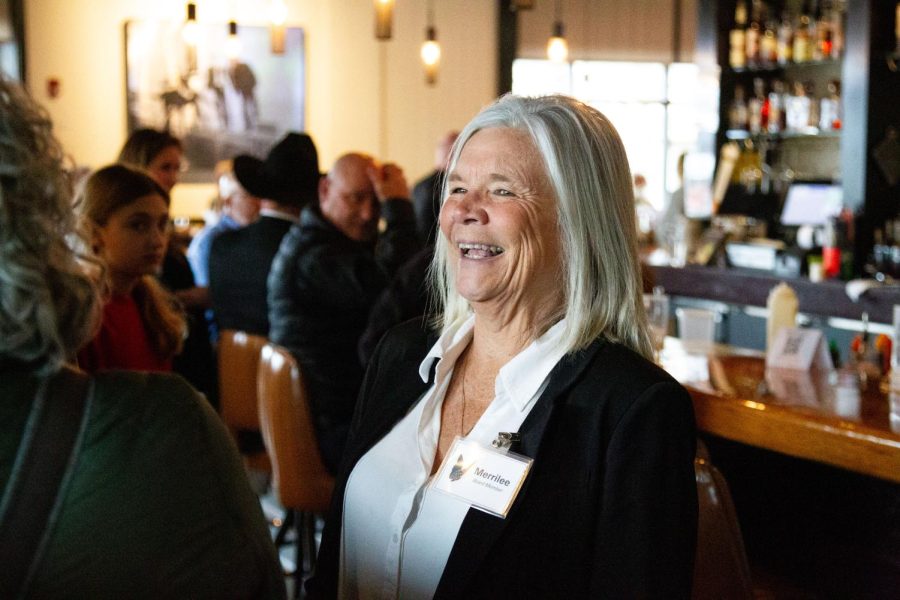A national shortage of sober homes
April 18, 2023
Residents will sign contracts before they move in promising they will abstain from substance use while staying at the sober home.
Women living in the home will also engage in their community, whether that be through a job, education, or volunteer work. They will also be required to enroll in a recovery program — most often a 12-step program.
Self-care activities like in-house yoga, meditation, book clubs, and pet therapy will also be provided to help residents develop healthy coping habits, Gardner said.
Currently, there are no long-term residential recovery communities for women in Johnson County or most surrounding counties. There are men’s homes in the Quad Cities and in Cedar Rapids, however, which follows the national trend of men’s sober homes outnumbering women’s two-to-one.
The nearest sober home for women in Cedar Riven Have, which operates near the Cedar River in Muscatine County. It’s a 45 minute drive from Iowa City.
Ramsey said Cedar River Haven created its own community, but its remote location makes interaction with the outside world difficult. She added that long-term treatment like that wouldn’t have appealed to her when she was in early recovery, so opening a sober home within an urban area was essential to her.
The nonprofit’s management has considered looking for homes outside Iowa City’s city limits, but Ramsey said the added distance away from jobs, recovery meetings, and the University of Iowa is less than ideal.
Gardner said it isn’t unusual for a place of Iowa City’s size to lack sober living care, but it is desperately needed.
“It’s not just Iowa City we’ll be serving,” Gardner said. “It’s all of eastern Iowa, really, and maybe beyond.”
So far, Iowa City Sober Living has turned down applicants looking for immediate placement in a sober home, and over 20 women are on a waitlist.
Ramsey said she hates turning women away because they lack a house. But the nonprofit’s hunt for a suitable location has been met with obstacles. Some dream homes came with price tags they can’t afford. Other places sold before the nonprofit could raise the funds to place a bid.
The nonprofit identified one home in fall 2022 that Ramsey said was on the historic registry and that had a lot of character. But the location only offered four bedrooms, which would limit the number of women they could take in at a time.
Even if the building the nonprofit ends up purchasing doesn’t make Ramsey melt when she walks in the door, she said they can make it that way once residents fill the home.
IC Sober Living recently identified a woman in recovery herself who expressed interest in working as a live-in house manager once she’s finished with her own program. Having someone further along in their recovery serve as a resident manager can help build trust between the staff and the residents, Ramsey said.
“That’s a huge move because that’s not going to be a fun job,” Ramsey said. “That’s a lot of responsibility.”
The house manager’s role is to facilitate weekly house meetings, organize activities at the house, and ensure the safety of the residents. Ramsey said she will screen all applicants and assist the house manager in the home’s early stages while the manager grows comfortable with the role. Additionally, Ramsey and Gardner will greet new residents and attend events like sobriety celebrations or program graduations.
Combating Iowa City drinking culture
Iowa City has a history of alcohol consumption. A USA Today article from 2021 ranked Iowa City the 31st drunkest city in the nation, a standing measured by the percent of residents who drink alcohol excessively and the percent of fatal car accidents where alcohol was involved. Iowa City isn’t the only city in the state to make it on this list.
Iowa also saw record-breaking liquor sales in fiscal 2022, according to a report from the Iowa Alcoholic Beverages Division. The ABD reported that $431 million worth of liquor was sold in Iowa last year — an increase of around $64 million compared to 2020’s sales.
These sales are spread between liquor stores that sell directly to consumers and bars and restaurants that are licensed to serve alcohol on their premises. Johnson County currently has 235 businesses with active Class C licenses — the designation given to bars and restaurants with permission to serve alcohol to customers. Of those businesses, 129 are in Iowa City.
Found between the liquor stores and clubs in downtown Iowa City is Unimpaired, a dry bar that serves non-alcoholic beverages. From the outside, Unimpaired doesn’t look much different than your standard bar, so much so that former Unimpaired employee Chapis Coronado thought it served alcohol the first time she visited with her family.
“We sit down, and then I remember the server brought menus to me, and I was like, ‘Oh no, I don’t want to drink.’” Coronado said. “I don’t even look at them just because they already looked like regular drinks like cocktails.”

Coronado was several months sober when she visited Unimpaired, which added to her regret when her mother later looked up the menu online and learned that the restaurant only served mocktails.
Soon after this experience, Coronado picked up a job bartending at Unimpaired, where she learned to make the drinks she thought she had to avoid on her first visit.
One of her favorites was a margarita mixed using non-alcoholic tequila. During days when she felt down in the dumps — days where she may have bought an actual drink just a few years ago — the placebo helped her fight off any urges.
“And even though it didn’t get me drunk — because that’s not what I wanted — it made me even more happy that I could drink something that had the taste,” Coronado said.
Beyond the faux drinks, Coronado loved working at Unimpaired because it provided a calm environment compared to other bars, and her kids could attend events like Tuesday night karaoke.
Unimpaired was also Coronado’s first real taste of Iowa City’s sober community. When patrons came in asking for specific brands of non-alcoholic liquor, Coronado knew to ask how long they’d been sober and if they’d be willing to share their story with her. In most scenarios, someone might feel uncomfortable talking about something so personal, but Coronado said Unimpaired’s atmosphere created a sense of trust.
The stories Coronado heard were all vastly different, but she said each came with what she described as their rock-bottoms.
“But everybody’s rock bottom is different,” Coronado said. “Sometimes it can be like mine, where it was just a realization. Sometimes it can be something really traumatic.”
Coronado decided to stop drinking because she said she didn’t want to expose her children to that kind of behavior. She’s maintained sobriety for a year and half, and while it was awkward at first going to parties without drinking, she said her friend group supports her decision. Some even see it as inspiration.
“When they’re around me, they don’t want to drink as much,” Coronado said.
Sometimes Unimpaired sits empty, something Coronado attributed to people’s lack of interest in drinking something that doesn’t get them drunk.
“Everybody just wants to get messed up,” she added.
She envisioned Unimpaired one day becoming a stop on the bar crawls UI students commonly participate in, either at the beginning or at the end so people can sober up.
The UI’s spring 2021 National College Health Survey found that around 82 percent of undergraduate respondents have ever consumed alcohol — almost 14 percent higher than the national average.
Heidi Schmitt, a social worker for the University Counseling Service, serves as co-coordinator of the UI’s Collegiate Recovery Program, which she described as a community that supports students who want to make changes to their substance use.
One example of support provided by the Collegiate Recovery Program is harm reduction education, which are practices like counting and pacing the number of drinks consumed when going out to bars or parties. The Collegiate Recovery Program also provides the Mindful Recovery support group for those looking to abstain from drinking altogether, Schmitt said.
“And then we’re offering recovery ally training,” Schmitt said. “And those are specific trainings to talk about what does it mean to be an ally to someone in recovery or someone who wants to make changes to their substance use.”
This allyship training ties in with other events hosted by the Collegiate Recovery Program as part of April’s Alcohol Awareness Month. Schmitt said she hopes these events will contribute to greater awareness on campus about the Collegiate Recovery Program and other resources available — both for people who know someone with substance addiction and for those who want to change their drinking habits themselves.
“I am positive there are certain students on campus that may not know this exists and that would benefit from it,” Schmitt said. “That’s something we’re working really hard on with social media and marketing.”
Mariah McKenna, a UI third-year student and the health and safety director for Undergraduate Student Government, called students the true voices on campus because they can best explain what drinking culture in Iowa City is like for young people.
“You can see statistics, but the student voice is really important because we actually are talking to each other,” McKenna said. “We’re interacting with one another. We’re going downtown.”
McKenna sits on the university’s Alcohol Harm Reduction Committee, which is composed of students, faculty, and community members and works to decrease high-risk drinking on- and off-campus.
“A big initiative is fraternity and sorority life,” McKenna said. “Kind of, you know, hitting where maybe people want the education, need the education — just to kind of reduce the high-risk areas on campus that may engage in drinking.”
McKenna’s committee also works closely with the UI Department of Public Safety. Students can sometimes be fearful of police, especially when intoxicated, so a student advisory board meets with the department once a month to share these experiences.
McKenna said she advises students to never leave someone alone if they need help or if they’ve had too much to drink. She added that students shouldn’t be afraid to visit the GuideLink Center, which provides urgent substance use care.
“If you can’t handle it, and you think it’s out of your control, never be afraid to contact the GuideLink Center because they’re a great resource to kind of help you get sober,” she said. “They have counselors on site, and it’s just a really great partnership that we’ve been working with.”
